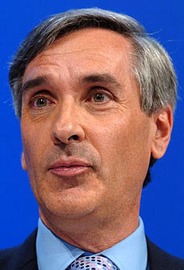OK. I hear you.
* * * * *
Oh wah, oh wah, oh wah, oh wah, oh wah, oh wah
Why do fools fall in love?
Why do birds sing so gay?
And lovers await the break of day
Why do they.
So chirruped Fankie Lymon and the Teenagers a zillion years ago. Ah, yes. I remember it well.
The song has been buzzing through my mind as I've applied it to more up-to-date events that call for answers to 'Why? Tell me why?'
For example, (Q1) why do so many people turn to 'the government' for solutions to their problems, even when it seems clear that they could find solutions themselves? And (Q2) why do so many believe 'the government' when they are told there isn't enough money (for NHS, for social care, for police manpower, just as starters)?

Never mind who said it. Do you agree with what he said? Yes? Go back to Q1 and ask yourself why people seem to want the government to run their lives when, mostly, what government does has nothing to do with protecting the people. Petitions for this, demands for that, running through the streets to complain about all manner of perceived injustices, and snarling angrily in the on-line comments columns of whichever daily newspaper or broadcaster has upset them today. Why? Tell me why! Is everything the fault of someone else?
In fact, the snarling bit is the thing that gets to me most. These days coarse language is just a start when people exchange insults and the feelings seem to run deep. Maybe it's always been so and it's simply that my upbringing doesn't lend itself to instant reactive vituperation.
In fact, the snarling bit is the thing that gets to me most. These days coarse language is just a start when people exchange insults and the feelings seem to run deep. Maybe it's always been so and it's simply that my upbringing doesn't lend itself to instant reactive vituperation.
When people behave this way all 'the government' needs to do is to keep the population arguing within itself. Easy peasy. While we fight our neighbours we have little time to worry about our government, have we?
I was at dinner with friends a little while ago and, inevitably, the conversation got around to the events of the day. I asked: Are you a sovereign person? (Or maybe I said 'do you think of yourself as a sovereign person?) The immediate reply was: 'Yes, of course I am!
So I asked what seemed to me the obvious next question: If you are sovereign, why do you/we surrender our/your sovereignty whenever a new government regulation is published? Sometimes - not always, of course - the 'government' demands something that seems unjust, unfair, not in your best interests or even downright dishonest. As an example, under threat of all kinds of retribution the government demands, via an arms length organisation (Department of Driver and Vehicle Licensing Agency), that you pay annual Road Fund Tax/Licence fees but it doesn't spend the money on roads. Surely, that's a fraudulent demand for money backed by intimidating threats if you don't comply, isn't it? As a sovereign being, why do you/why do I comply? Why do you allow yourself to be intimidated?
The answer that we all use, including me, is: 'Well, life is just that bit easier if we don't debate and argue everything. So we give in for the sake of peace and quiet - and we don't get a fine or a gaol sentence. Yet we still assert that we are sovereign beings. No wonder we are continually under pressure and sometimes feel depressed. We aren't being true to ourselves. We aren't being honest.
And Q2? I hadn't forgotten Q2. That question is absolutely basic and is central to the deception under which all of us live, often without realising it.
How often do you ask yourself the question: "Where does money come from?" and when you do ask, what answer do you give yourself? I can recall in years gone by that I'd worked out that Arabs had all the money because we bought their oil. And the Chinese did well because we bought the food they prepared and sold here and afterwards sent the money back to China. How naive. Clearly, whilst it plays a part, trade isn't the whole answer. Trade exchanges goods and services and provides great benefit but it doesn't create money.
Does your answer ever include the idea that money is made out of thin air? Magicked into existence from nothing? Well, hush my mouth and perish the thought. Nevertheless, more and more of us have come to that realisation. The bankers and 'the government' have known it all along. They just didn't tell us (which is dishonest) or, if they did, we didn't pay attention (which is foolishness on our part). We concluded, simply, that the purpose of life is to collect as much of the stuff (money) as we can and the devil take the hindmost. No wonder a wise man once wrote that 'the love of money is a root of all kinds of evil.' Money isn't evil, note. The love of money is the problem.
Does your answer ever include the idea that money is made out of thin air? Magicked into existence from nothing? Well, hush my mouth and perish the thought. Nevertheless, more and more of us have come to that realisation. The bankers and 'the government' have known it all along. They just didn't tell us (which is dishonest) or, if they did, we didn't pay attention (which is foolishness on our part). We concluded, simply, that the purpose of life is to collect as much of the stuff (money) as we can and the devil take the hindmost. No wonder a wise man once wrote that 'the love of money is a root of all kinds of evil.' Money isn't evil, note. The love of money is the problem.
That £20 note we fold into our wallet or purse is nothing more than a promissory note. It says so right under the fancy writing that reads 'Bank of England'. 'I promise to pay the bearer on demand.' Who says so? The Chief Cashier for the Governor and company of the Bank of England.
THE COMPANY, please note.
THE COMPANY, please note.
And he added his signature. He undersigned/underwrote it on behalf of the Governor and the company. We take it at face value but rarely challenge the promise. Probably, it's just as well that we don't but we might fare better if we understood the reality.
The reality that many of us now understand, is that money is created out of thin air via simple book-keeping. You ask the bank to lend you £100,000 to buy your house (and the bank encourages you to ask!) and the bank simply writes that amount on one side of its ledger and assigns it to you, thus creating instant debt to be repaid with interest. The interest will be real and is based on the sweat of your brow. You have to find value added ways to obtain the money to service the manufactured debt that you agreed to when YOU undersigned/underwrote it. So we place ourselves into a form of slavery to enable us to repay a manufactured debt. Looked at that way it all seems a bit cock-eyed, doncha think?
I conclude with a statement by Ron Paul. Who he? He is an American libertarian Republican and an author, physician and former politician. He was formerly the U.S. Representative for Texas' 14th and 22nd congressional districts. He noted that the Founding Fathers, when drawing up the American Constitution, didn't assert that it is about democracy. Instead they used the words 'liberty' and 'pursuit of happiness.' After breaking away from the constraints imposed by King George and his henchmen, the founding fathers considered themselves to be free men. Or, put another way, they claimed their right to be sovereign people. And there is nothing a tyrant hates more than that.
I don't think I need to say more this week.
Michael
The reality that many of us now understand, is that money is created out of thin air via simple book-keeping. You ask the bank to lend you £100,000 to buy your house (and the bank encourages you to ask!) and the bank simply writes that amount on one side of its ledger and assigns it to you, thus creating instant debt to be repaid with interest. The interest will be real and is based on the sweat of your brow. You have to find value added ways to obtain the money to service the manufactured debt that you agreed to when YOU undersigned/underwrote it. So we place ourselves into a form of slavery to enable us to repay a manufactured debt. Looked at that way it all seems a bit cock-eyed, doncha think?
I conclude with a statement by Ron Paul. Who he? He is an American libertarian Republican and an author, physician and former politician. He was formerly the U.S. Representative for Texas' 14th and 22nd congressional districts. He noted that the Founding Fathers, when drawing up the American Constitution, didn't assert that it is about democracy. Instead they used the words 'liberty' and 'pursuit of happiness.' After breaking away from the constraints imposed by King George and his henchmen, the founding fathers considered themselves to be free men. Or, put another way, they claimed their right to be sovereign people. And there is nothing a tyrant hates more than that.
I don't think I need to say more this week.
Michael

 In UK, if you buy your own home and save for your old age you end up paying for
your own stay in a care home should you need one. If you rent your
home and spend all your earnings the state will pay for your time in the
care home at the end of your life.
In UK, if you buy your own home and save for your old age you end up paying for
your own stay in a care home should you need one. If you rent your
home and spend all your earnings the state will pay for your time in the
care home at the end of your life. Umberto Eco was an Italian novelist, literary critic, philosopher,
semiotician (l
Umberto Eco was an Italian novelist, literary critic, philosopher,
semiotician (l